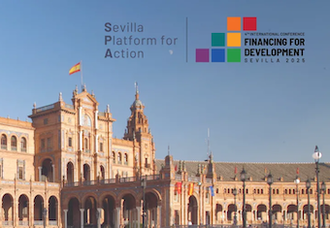Economists backed by Vatican seek fair way to solve global debt crisis

Screenshot
Source: CAFOD
World leading economists, backed by the Vatican, say basic common sense would be enough to solve the global debt crisis that is stifling development in the world's poorest and most vulnerable countries.
Leaders gathering for the Financing for Development conference in Seville, are facing urgent calls from leading economists as well as the Vatican, for action to solve the current debt crisis.
Debtor countries have long called for a fair and transparent system to govern global debt, and the Fourth Financing for Development conference being held in Spain has a rare opportunity to make that happen.
The question is not "should we", but rather "when will we" do what we can to create a more sustainable future, that supports rather than stifles development? When, too, will governments like the UK listen to the voices and warnings coming from the global south?
The FfD4 conference, taking place from 30 June to 3 July, happens only once a decade. Governments, international organisations, as well as civil society, business and now religious leaders, will come together to discuss how to fund global development.
The conference this year begins and ends with discussions on debt:
At 1.30pm BST on, Monday, 30 June: 'A Jubilee for the Common Good: Revisiting the Global Financial Architecture for People and Planet' an international panel will discuss the reform of the international financial architecture, to place people, rather than profit, at the heart of the global economy.
Panellists will include Archbishop Gabriele Caccia, the Vatican representative to the United Nations, and Ms Penelope Hawkins, Chief of Debt and Development Finance, UNCTAD, and journalists and delegates are welcome to attend.
At 7.30am BST on Thursday, 3 July: 'Tackling the Debt and Development Crisis in Jubilee Year 2025' will feature a landmark report commissioned by the Pope, and released last week by IPD (Initiative for Policy Dialogue) and the Jubilee Commission of Experts on Debt.
The Vatican Commission, comprising 30 world-leading economists and experts, was commissioned by Pope Francis shortly before he died, to find workable solutions to the global debt crisis. Their work is being encouraged by Pope Leo XIV, who called for "a spirit of solidarity" to address a destiny shared "by debtors and creditors alike".
CAFOD's Lead Economist, Maria Finnerty said: "With 54 countries now in debt distress, it is clear that the current system is broken. The UK government must do more to help solve the global debt crisis. It is not enough to sit on the sidelines and watch, while more than half the world is stuck in a spiralling situation that could so easily be fixed.
The UK's role in blocking calls in New York for a new framework from the UN was disappointing. Governments must work together and stay the course to create a better future. Words on paper must be matched with real action if they are to have meaning."
CAFOD Public Policy Manager, Pablo Soriano Mena said: "Every day nearly half the world's population is caught up in the double crises of spiralling debt that is stifling development. The UK is in a privileged position to act. It has the capacity, influence, and experience to lead and to be a key ally in building a fairer and more sustainable global financial system.
We don't just have the resources to act - we also have a quick and lasting solution in our hands. This once-in-a-decade opportunity in Seville is the perfect opportunity to create a more sustainable future for everyone and make this a decade to defend development and solve the causes of this debt crisis."


















